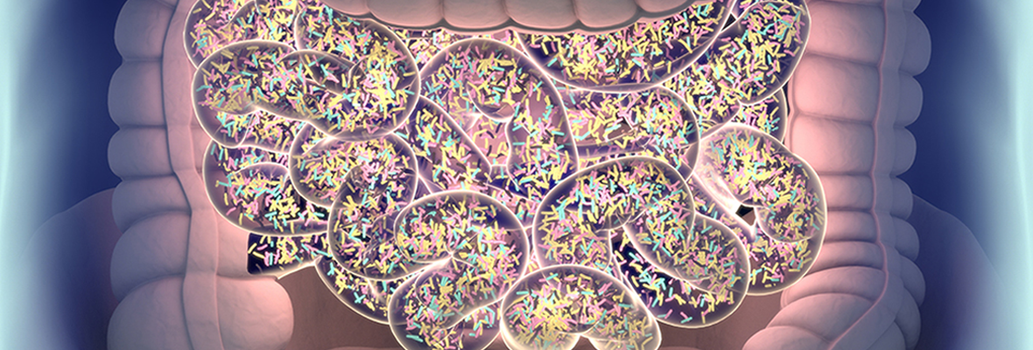
Can the bacteria in your gut change what you weigh?
Lately, it might feel like you can’t pick up a magazine or scroll through your newsfeed without hearing about the role the gut microbiome can play in immunity, mental health and inflammation. It may even impact your waist line.
This is an emerging area of research with some exciting findings. By comparing the gut bacteria of slim and overweight people, researchers are learning which bacteria can better support weight management and how you can get more of them.
Interestingly, food choices may be able to change the balance of your gut microbiome to increase the bacteria associated with being slim and decrease the bacteria associated with being overweight.
The microbiome is the colony of bacteria (or microbes) in your gut which operate in a delicately balanced system – a bit like the ecosystem in a rainforest. The microbes include trillions of bacteria, fungi and viruses, which help the body produce vitamins and amino acids. Stress, illness, antibiotics and food choices can all affect the balance of the gut microbiome.
Did you know? The entire microbiome in our gastrointestinal tract can weigh up to 2kg and is as unique as our fingerprints
Gut bacteria may be affecting the way you digest food, balance blood sugar, regulate appetite and store fat. The diversity of the bacteria in your gut and the balance between ‘goodies’ and ‘baddies’ are the two key ways in which the microbiome may do this.
Diversity: Research suggests this is the key to a balanced gut. A study that compared gut bacteria in twins, where one twin was slim and one was obese, found that thin twins had a much more diverse range of bacteria in their gut than their obese siblings.
Balance: There is also evidence that there are certain bacteria that can affect the way we digest food. Research from Washington University School of Medicine found that an overabundance of one type of bacteria called firmicutes may be related to weight gain. In contrast, being slimmer was associated with having a wider variety of another important type of bacteria known as bacteroidetes.
This is an emerging area of research with some exciting findings. By comparing the gut bacteria of slim and overweight people, researchers are learning which bacteria can better support weight management and how you can get more of them.
Interestingly, food choices may be able to change the balance of your gut microbiome to increase the bacteria associated with being slim and decrease the bacteria associated with being overweight.
What is the microbiome?
The microbiome is the colony of bacteria (or microbes) in your gut which operate in a delicately balanced system – a bit like the ecosystem in a rainforest. The microbes include trillions of bacteria, fungi and viruses, which help the body produce vitamins and amino acids. Stress, illness, antibiotics and food choices can all affect the balance of the gut microbiome. Did you know? The entire microbiome in our gastrointestinal tract can weigh up to 2kg and is as unique as our fingerprints
How does our microbiome affect our weight?
Gut bacteria may be affecting the way you digest food, balance blood sugar, regulate appetite and store fat. The diversity of the bacteria in your gut and the balance between ‘goodies’ and ‘baddies’ are the two key ways in which the microbiome may do this. Diversity: Research suggests this is the key to a balanced gut. A study that compared gut bacteria in twins, where one twin was slim and one was obese, found that thin twins had a much more diverse range of bacteria in their gut than their obese siblings.
Balance: There is also evidence that there are certain bacteria that can affect the way we digest food. Research from Washington University School of Medicine found that an overabundance of one type of bacteria called firmicutes may be related to weight gain. In contrast, being slimmer was associated with having a wider variety of another important type of bacteria known as bacteroidetes.
What can you do?
The good news is that you can change your gut bacteria almost immediately with your food choices. Research shows dramatic changes in gut bacteria within just a week of changing your diet.- Fill up on fibre: Fibre is what experts call a prebiotic, which helps to feed the good bacteria already in your gut. By adding 21g fibre/day to their diets, people in a trial at the University of Illinois changed their balance of bacteroidetes and firmicutes in just three weeks.
- Whole plant foods: Include as many plant based whole foods as possible. Healthy gut bacteria love fructans, which you can find in bananas, onions, garlic, leeks, asparagus, Jerusalem artichokes, chicory root, soybeans, and wholegrain foods like rye and barley.
- Sauerkraut and yoghurt: While prebiotics like fibre feed the good bacteria in your gut, fermented probiotic foods like sauerkraut and yoghurt ensure you are putting more good bacteria into your gut.
- Resistant starch: Legumes, cooked and cooled potatoes, and cooked and cooled rice all contain good levels of resistant starch, which also acts as a prebiotic to feed good gut bacteria.
- Limit junk: Research suggests that there are foods that can damage the microbiome. In an experiment on his own son, genetics professor from Kings College London Tim Spector found that just one week of eating only junk food decimated his son’s microbiome, reducing the estimated species by 40%.
More in

The latest nutrition advice, plus health and wellness tips delivered to your inbox monthly